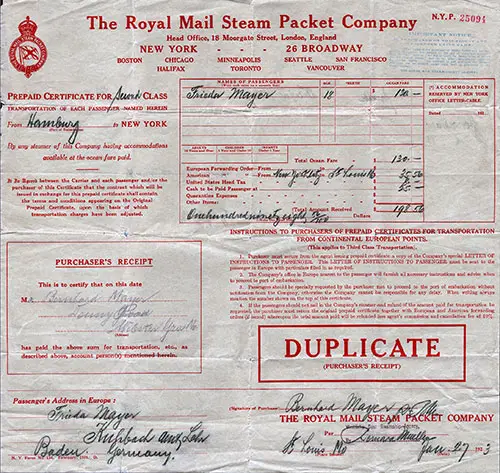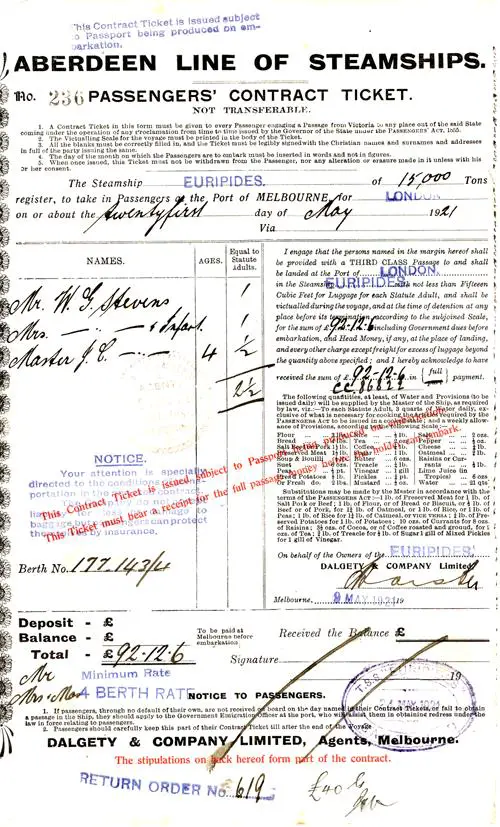Everything You Need To Know about Steamship Passage Tickets

RMSP Second Class Prepaid Certificate, 27 January 1923. GGA Image ID # 1fa78e2cfb
STEAMSHIP TICKETS
The immense and ever-increasing traffic between the United States and Europe has created demands for steamship lines going to all the principal ports of Great Britain and the Continent, likewise a scale of prices which grows yearly more extended.
There is a wide choice between the palatial fast steamer sailing from New York, and the small ship considered an example of elegance and rapidity in former years. Still, today relegated to lines sailing from Philadelphia or Boston to accommodate passengers who desire cheaper rates.
The best-known agents are prepared to furnish all manner of information about the rates and accommodations of various steamships. The tour that the prospective traveler has planned should strongly influence the choice of his steamer.
It is most advisable to sail directly to some port in the country where the tour begins. Such a choice will be found more economical and more desirable than that of taking passage to England and then crossing the uncomfortable and wayward Channel for the Continent.
The great fast steamers are by no means always the most comfortable conveyances for crossing the ocean on a pleasure trip. They are usually overcrowded during the busy season, and, unless the tourist is exceedingly pressed for time, their speed does not offer sufficient compensation for other annoyances.
The fact that the slower boats are more and more patronized by those to whom additional expense is no object is a sign of the popularity of these comfortable steamers.
The ships built in recent years are fitted with steadying double keels. The slower ships with lesser size and power engines are by far the steadier. Still, the swift steamers carry such large engines that while these keels prevent the rolling and pitching, the vibration continues and is highly unpleasant.
The fast steamers charging the highest prices for their accommodations find it impossible to take as good care of the vast number of their patrons as the lines with limited passenger room.
On these great floating hotels, where there are sometimes eight hundred passengers, the decks are frequently so crowded by chairs that three or four tightly packed rows fill and obstruct all but a narrow passageway. The stewards are so busy that they cannot give proper attention to those who need their care with the best intention in the world.
The freight and transport lines and those who carry a limited number of passengers offer ampler deck room. These ships are highly recommended for those crossing the ocean on a pleasure trip.
Certain ships are more desirable on every line than others, so passengers should make the selection with great care. Tastes differ so widely among men and women that it is challenging to depend upon the judgment of one's friends.
Still, private opinion is frequently of more value than the recommendation of the best-intentioned agent who, with thousands of questions to answer, finds it almost impossible to do the right thing or to give the correct advice to people whose personal likes and dislikes he cannot possibly have any way of determining.
THE RETURN TICKET
Purchasing a return ticket should be seriously considered when the stateroom has been selected. Unless the stay abroad is indefinite, and there is some other substantial reason for hesitation, it is a wise precaution to secure a desirable stateroom in advance.
Should a tourist afterward decide to prolong his stay in Europe, he will find the company from whom he has bought return tickets only too willing to exchange these and give the holder of such tickets the first chance for the best stateroom available at the rate paid.
When buying tickets at any steamship office, a deposit of $25 is required, the least of the passage money to be paid three weeks before sailing; passengers must pay for a return ticket in full. There is sometimes a reduction of ten percent on the return portion of the ticket, but in the busy season, only a few lines grant this rebate.
If no stateroom is engaged, a tourist who buys a return ticket on any one of those lines in the Steamship Combination (listed at the end of this article) has a choice of returning when he is prepared to do so by any ship belonging to the list printed on his ticket.
If he chooses a stateroom of a higher price than what he paid when buying his ticket, he will be obliged to make up the difference. On the other hand, if he selects a cheaper cabin, the steamship line will refund the extra amount paid to him.
WHAT IS A STEAMSHIP TICKET?

SS Euripides of the Aberdeen Line Passage Contract, 21 May 1921. GGA Image ID # 1fa77289ff
It is a document of paper bearing the line's name for which it is purchased. On it is a printed agreement to transport the passenger according to the company's rules, noting the name of the ship, the number of the cabin, and the berth.
When a return ticket has been purchased, that fact, together with either the ship or names of the several lines on which the passenger is permitted to return, is also mentioned. After the steward has collected the document, the purser makes another ticket and returns it to the passenger.
The following are the lines in the Combination (a.k.a. International Mercantile Marine Company (IMM))
- American Line
- Atlantic Transport Line
- Dominion Line
- Leyland Line
- Red Star Line
- White Star Line
Josephine Tozier, Compiler, “Section II: Taking Passage.” In The Travelers’ Handbook: A Manual For Transatlantic Tourists, New York and London: Funk & Wagnalls Company, 1905, Page 29-34. Images from the GG Archives Immigration Collection.
